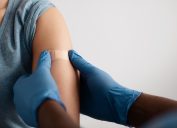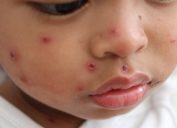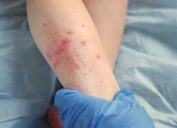The 6 Easiest Ways to Catch Norovirus, and How to Avoid Them
Experts share how to protect yourself against the dangerous stomach bug as cases spike.

Waking up to an upset stomach is always unpleasant, but it could be cause for even more concern right now, as norovirus is surging across the U.S. The latest data from the Centers for Disease Control and Prevention (CDC), which was last updated on Feb. 29, shows that the current three-week average rate for positive norovirus tests in the country is 12.3 percent.
Colloquially known as the "stomach bug," "norovirus is highly contagious," Kelly Johnson-Arbor, MD, a medical toxicology physician and the co-medical director of the National Capital Poison Center, tells Best Life. Common symptoms include diarrhea, vomiting, nausea, and stomach pain, and they typically start anywhere from 12 hours to two days after you initially come in contact with the virus, according to Johnson-Arbor.
This is not a a pleasant illness to face. You may end up feeling extremely sick while vomiting or having diarrhea many times a day—both of which can lead to "life-threatening dehydration," Johnson-Arbor warns. And while most people with norovirus do end up getting better within a few days, it causes on average 900 deaths and 109,000 hospitalizations in the U.S, each year, according to the CDC.
The bottom line is that norovirus is not something you want to endure, which is why it's so important to focus on prevention. To help you stay healthy, we've put together the most common ways to catch it, along with what you can do to protect yourself. Read on for our experts' best advice.
RELATED: Norovirus Cases Spiking Across U.S.—These Are the Symptoms.
1
Touching contaminated surfaces
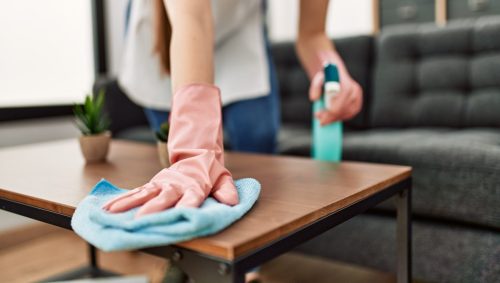
You should be taking extra caution to make sure your hands are only coming into contact with clean surfaces.
Michael Newell, vice president of the science-based disinfectant startup AvantGuard, says that touching contaminated surfaces is one of the easiest ways people can catch norovirus. All it takes is a quick brush of the face or mouth with your hands for you to get infected.
After an infected person throws up or has diarrhea, "contaminated surfaces should be cleaned and disinfected immediately," he says.
Newell recommends using a chlorine bleach solution with a concentration of 5 to 25 tablespoons of household bleach per gallon of water, or a disinfectant that has been deemed effective against norovirus by the Environmental Protection Agency (EPA).
RELATED: 5 Hand-Washing Mistakes That Can Expose You to Norovirus or the Flu, Doctors Say.
2
Consuming contaminated food or drink

Paying attention to what you're eating is important because you can also catch norovirus that way. The virus can "easily contaminate food and water because it only takes a very small amount of virus particles to make you sick," according to the CDC.
Johnson-Arbor says many people aren't aware that norovirus can infect them through food.
"Foods can become contaminated with norovirus when they are touched by an infected person, or when they are exposed to contaminated water that contains fecal waste," she explains. "So even if nobody in your family is infected with norovirus, you could still contract it from eating fresh produce that was inadvertently irrigated with contaminated water on the farm, or from eating raw oysters that were harvested from an area with contaminated water."
Err on the side of caution if you're concerned about exposure. "Food that might be contaminated with norovirus should be thrown out," Newell warns.
To be safe, you should also thoroughly rinse fruits and vegetables, as well as cook oysters and other shellfish to an internal temperature of at least 145 degrees Fahrenheit, according to Newell.
"Be aware that noroviruses are relatively resistant," he notes.
3
Direct contact with an infected person

Those infected with norovirus can shed billions of viral particles that are not visible to human eye, and it only takes a few of those particles to make someone else sick, per the CDC.
"Norovirus is highly contagious because it takes as little as 18 viral particles to cause infection compared with influenza A, which requires transmission of thousands of viral particles to cause infection," Johnson-Arbor explains.
That means it's hard to avoid getting sick if you come in direct contact with an infected individual.
"If you think you have contracted norovirus, stay home and avoid others if possible," Johnson-Arbor advises. "Because norovirus can still be passed from person to person even after initial symptoms have resolved, it's best to avoid food preparation or close contact with other individuals for at least two days after symptoms resolve."
RELATED: I'm a Nutritionist and Here's Exactly What I Do to Not Get Sick.
4
Cleaning up after someone who is sick
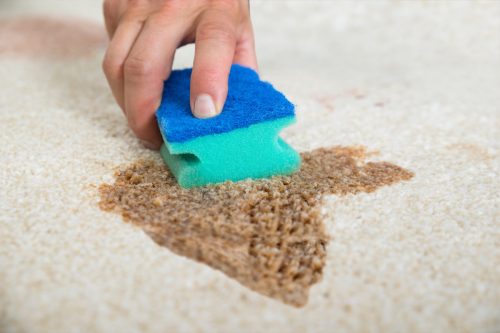
Of course, you can't always avoid being near people with norovirus. If someone in your household has gotten sick, you might be the only one available to look after them—but that will put you at a heightened risk of infection.
"People can catch norovirus when they clean up after an infected individual vomits or has diarrhea, or when they change the diaper of an infected individual," Johnson-Arbor cautions.
It's not inevitable, however. Taking preventative measures can help you stay healthy even while caring for someone who is sick. The most important? Properly washing your hands, according to the CDC.
"To avoid contracting norovirus from other people, it's recommended to wash your hands frequently with soap and water instead of using hand sanitizer, as alcohol (the main ingredient in many hand sanitizers) doesn't reliably kill the virus," Johnson-Arbor says.
5
Not properly washing laundry

Norovirus can leave a mark on your linens, too. You should immediately wash any clothes that may have been contaminated with feces or vomit, according to Newell.
"Wear rubber or disposable gloves when handling contaminated clothing and thoroughly wash hands when done," he says. "Wash with detergent on a long cycle and dry in a dryer."
The CDC also recommends that you handle any potentially contaminated laundry items "carefully without shaking them."
6
Sharing utensils

People with norovirus can infect you even if they're not presenting with symptoms, according to the Minnesota Department of Health. That's why it's a good idea not to share certain things with those around you, regardless of how healthy they seem.
The CDC warns that "sharing utensils or cups with people with people who are infected with norovirus" is one of the many ways the virus can infect you.
Best Life offers the most up-to-date information from top experts, new research, and health agencies, but our content is not meant to be a substitute for professional guidance. When it comes to the medication you're taking or any other health questions you have, always consult your healthcare provider directly.




